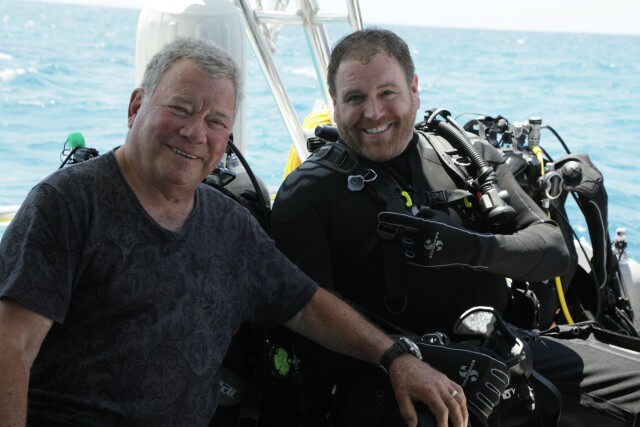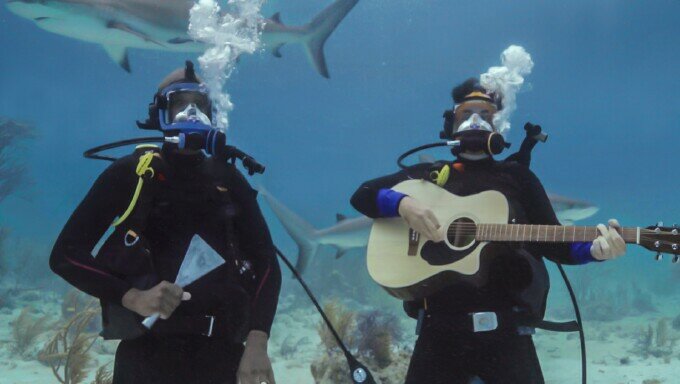Discovery's Shark Week Chomps Down on 45 Hours of Programming

Finally, it's time for those fangtastic days of summer, when long in the tooth means more than old. It means scary and fascinating. Yes, we're talking about Shark Week. Discovery and discovery+ kick off the 33rd annual predator party on July 11.
This year brings 45 hours of programming, including William Shatner in a special edition of Discovery's Expedition Unknown titled, Expedition Unknown: Shark Trek on July 12. Host Josh Gates' Trekker nerdiness reaches enterprising levels as the duo flies to the Bahamas. (Shatner and Gates are pictured at top.) At the start of the show, Shatner confesses, "I am deathly afraid of sharks."
Conquering that fear, they wade into a shark-filled lagoon. As Shatner espies a dorsal fin glide by, he calls it "the periscope of death."
Shark Week also brings Tiffany Haddish Does Shark Week. Haddish,as it happens, was curious about shark sex. (Who isn't?) Her special will be telecast July 11.
The week continues with that special programming mash-up Shark Week is known for -- a goofy sense of humor with ballast in scientific fact.
Howard Swartz, Senior Vice President of Documentaries and Specials / Networks and Streaming, took a deep dive exclusively with MediaVillage to discuss the phenomenon that is Shark Week.
"I love Shark Week for a number of reasons," Swartz said. "Sharks have evolved into being the perfect predators over hundreds of millions of years, they have survived every mass extinction, and they're the top apex predators in the ocean. I think there's a great mystery around that, and there's a lot of innate primordial fear in that as well."
Like so many, Swartz did not think all that much about sharks until the summer of 1975. Cue the music for Jaws.
"I wouldn't even go in a bath for years," Swartz recalled, laughing. "As a kid after seeing Jaws, I was just so terrified. And it does tap into something like that. I think that once you get to know these animals you see how amazing they are, that they're not mindless killing machines, that they are incredibly intelligent and just magnificent. And beyond that, their importance to the ecosystem is so critical. God forbid if these apex predators were to go away. I mean, so goes the ocean -- so goes the Earth."
Documentaries detail how biologists gather evidence to understand where sharks breed and how they adapt to an ever-changing world. These films will keep the most ardent fin fan happy with facts such as, "White sharks are feeding on much more than before," as we learn in Mega Predators of Oz (streaming on discovery+).
Still, as fascinating and compelling as the many documentaries are, the networks are also running the two most famous and wildly fictional shark movie franchises. The four Jaws movies are on the network, and the six Sharknado films are streaming. Hilarious and addictive, they're intentionally ridiculous. Andy Dick as a New York City cop? Who could ever believe that?
Oh, and the movies' premise is that massive groups of sharks swirl up out of the water in tornadoes to go on killing rampages while destroying cities. In these, sharks can climb stairs. It takes the heroism of Fin Shepard, a chainsaw-brandishing Ian Ziering, to save us.
Tapping into the franchise's fanbase, the network premieres The Real Sharknado (July 14). Tara Reid stays in a cage, protecting her from sharks, while Ziering swims with them, sans chainsaw. "It's time to separate fact from fiction and the sharks from the storm," the narrator announces. "Contrary to Sharknado science, recent tracking research indicates that during a storm, sharks actually retreat from the surface and head to deeper water."
If you are gleaning your marine biology knowledge from Sharknado, now would be a perfect time to dip into the documentaries. Granted, there are a lot of shark shows, and some people may get confused.

Take J.B. Smoove.
The comedian's friend, country singer Brad Paisley (pictured above, right, with Smoove), is a diehard Shark Week fan and a lifelong admirer of sharks. When Discovery executives heard about this, "We jumped all over that and found a way to organically have him participate in the show because one of the things researchers look at is what sounds attract sharks and which sounds repel them," Swartz said.
Paisley wanted his pal to accompany him. "Brad calls J.B. to participate, and J.B. shows up, and he's talking with Brad," Swartz recalled. "He's got all these ideas for inventions. He legitimately thought he was signing up for Shark Tank!"
Smoove, however, was still game, and he's in Brad Paisley's Shark Country (airing July 13).
When Shark Week officially launches on the network at 8 p.m. July 11, it will be with a familiar name. Crikey! It's Shark Week features Robert Irwin. Like his late father, Steve Irwin, Robert gets close to creatures, including a great white shark.
While we may be terrified of them, let's not forget that humans kill 100 million sharks annually, a result of destructive fishing and hunting for fins, meat and oil. In FIN (streaming July 13) filmmaker Eli Roth, scientists and activists sail the world to uncover why millions of sharks are killed. "FIN is the scariest film I've ever made, and certainly the most dangerous, but I wanted to send a message of hope to end this needless massacre of sharks," Roth, who specializes in gruesome horror movies, said in a statement.
Still, news reports about sharks attacking do seem more common, and Raging Bulls (streaming July 15) documents Australia's bull sharks becoming more aggressive. In I Was Prey: Shark Week 2021(airing July 17), two folks who survived shark attacks recount their stories.
After all these years, the purpose of Shark Week remains to teach viewers about these ancient creatures that have survived 450 million years.
"Not to be histrionic about it, but they are critical to the health of not just the oceans, but of the planet," Swartz explained. "When you combine how amazing they are, that sort of intrinsic fascination people have with them, with their importance … for me, that's what's so fun about it, to bring audiences face-to-face with these animals that they may not quite understand or may have a fear about. To show how amazing they are, but to do so in a way that's super entertaining [and] also sort of reinforces the notion of how important they are.
"If we do our job right, it's for people to walk away thinking that these are amazing animals," Swartz concluded. "They're worth saving. If we can change people's perceptions and have them see them for the beauty and the wonder and all that they inspire, that's the ultimate takeaway."
Click the social buttons to share this content with your friends and colleagues.
The opinions and points of view expressed in this content are exclusively the views of the author and/or subject(s) and do not necessarily represent the views of MediaVillage.com/MyersBizNet, Inc. management or associated writers.


